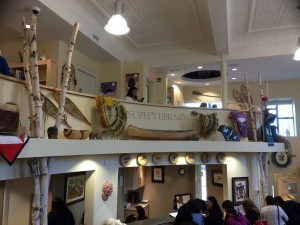In August 2015, the University of Manitoba in Winnipeg hosted the 9th International Indigenous Librarians’ Forum The biennial event, hosted among five countries, was the event of the summer for indigenous Canadian knowledge keepers, librarians, archivists, curators, information managers and those working in cultural heritage and language preservation.
Several delegates made the trip from BC, including representatives from Simon Fraser University’s Library and UBC’s Xwi7xwa Library, iSchool, and Audrey and Harry Hawthorn Library and Archives. We met up with our colleagues from across the country, including a large delegation from Saskatchewan who arrived by charter bus. International friends from as far as Norway, New Zealand, and Australia were also in attendance. The Convenor and Forum co-chair was Camille Callison of the Tahltan First Nation in Northern BC. Camille is the Indigenous Services Librarian at the University of Manitoba. The whole event was led by a council of Elders, including co-chair David Courchene, Jr.
The forum creates an opportunity to network and exchange ideas of best practices within libraries, museums, archives and educational institutions. It was formed to address ways to foster and preserve language, traditions, culture and the values of Indigenous peoples from all over the world (Sinclair-Sparvier & Mangan, 2008). The IILF was held on Treaty One territory – the traditional territory of the Anishinaabe peoples and the homeland of the Métis Nation.
The first major event of the forum was a day trip to Turtle Lodge, located at Sagkeeng First Nation. Delegates participated in a cultural experience of traditional teachings and ceremonies that were led by Courchene and other Elders and Traditional Teachers. To observe lodge protocol, women wore long skirts and everyone was offered the opportunity to smudge, partake in the sacred water ceremony, and learn of the seven teachings. After feasting on a traditional lunch of deer, wild rice, bannock and rice pudding, we had an opportunity to purchase locally developed monographs for our collections. The event closed with the presentation of the sacred Māori stone in its newly carved home – a bentwood box – for safekeeping at the Turtle Lodge until the next IILF.
Delegates also visited the National Centre for Truth and Reconciliation, the People’s Library at the Manitoba Indigenous Cultural Education Centre, the Winnipeg Public Library’s Aboriginal Reading in the Round, the Universities of Winnipeg and Manitoba Libraries and the Canadian Museum for Human Rights. Memorable moments included Wab Kinew’s luncheon keynote address at the University of Winnipeg, dining at the Forks and viewing the Mazinbiige Indigenous Graphic Novel Collection at the University of Manitoba’s Elizabeth Dafoe Library.
Another important element of the forum included formal presentations. We had the privilege of hearing from Brian Deer himself. Brian was a practising librarian for only three years, and he told us of his surprise one day after Googling his name and finding information about a classification system! For those not familiar with his notoriety in the indigenous librarianship sphere, Brian is a Kahnawake Mohawk who invented an indigenous classification system in the 1970’s for the National Indian Brotherhood. This system is used, in its various iterations, in several Canadian Aboriginal libraries today.
The BCLA First Nations Interest Group partly sponsored a presentation by Wet’suwet’en – Nadleh Whut’en (BC) librarian Gene Joseph. Gene rallied us around a key point: our work is valued and necessary in the ongoing legal battlegrounds for Indigenous rights. To exemplify this, she spoke of her work developing a legal research library for the Gitxsan and Wet’suwet’en First Nations around the Delgamuukw case (UBC Law Library, 2015).
Gene Joseph was the founding librarian at UBC’s Xwi7xwa Library. Current Xwi7xwa librarians, Dr. Ann Doyle, Kim Lawson, and myself, also participated in the formal program. We presented on the Indigenizing the Academic Library in the Mainstream Post-Secondary Institutions in Canada panel with the Deborah Lee (University of Saskatchewan), Jessie Loyer (Mount Royal University) and Jenna Walsh (Simon Fraser University). We also participated on the international panel on Knowledge Management with Alana Garwood-Houng (Australia), Camille Callison (Manitoba), Alissa Cherry (British Columbia) and Anahera Morehu (New Zealand). Xwi7xwa delegates gave two poster sessions and provided information about our latest contributions to indigenous librarianship literature.
IILF is not expected to return to Canada for another ten years, according to the original rotation schedule of the five founding countries. The next IILF will be hosted in Sydney, Australia, in 2017. Until then, several IILF delegates will be working towards the establishment of an Indigenous Matters Section of the International Federation of Library Associations and Institutions (IFLA). Please view the call to action online for information about how your organization can support these efforts.
Sarah Dupont is the Aboriginal Engagement Librarian at Xwi7xwa Library and the Irving K. Barber Learning Centre at the University of British Columbia. Her role at UBC Library includes providing reference and instruction services, outreach, and programming, in addition to managing the Indigitization program. She has been the BCLA’s First Nations Interest Group convener since 2012.
References
* Anikoo Gaagige Ganawendaasowin was the conference theme. From the conference website, it is translated: “As Keepers of Knowledge that came from the Creator and that we are tied to our mothers through the umbilical cord, it is the responsibility of each child to pass down this knowledge from one generation to the next generation. In Anishnabe the words; aniko means to ‘extend,’ gaagige means ‘eternal,’ and gaanawendaasowin means ‘keeper.’”
UBC Law Library. “Delgamuukw Resources Research Guide.” http://guides.library.ubc.ca/delgamuukw. 2015.
Wendy Sinclair-Sparvier and Hinureina Mangan. International Indigenous Librarians’ Forum 1999 – 2009 Background & Outcomes from Past Fora. November 2008.


